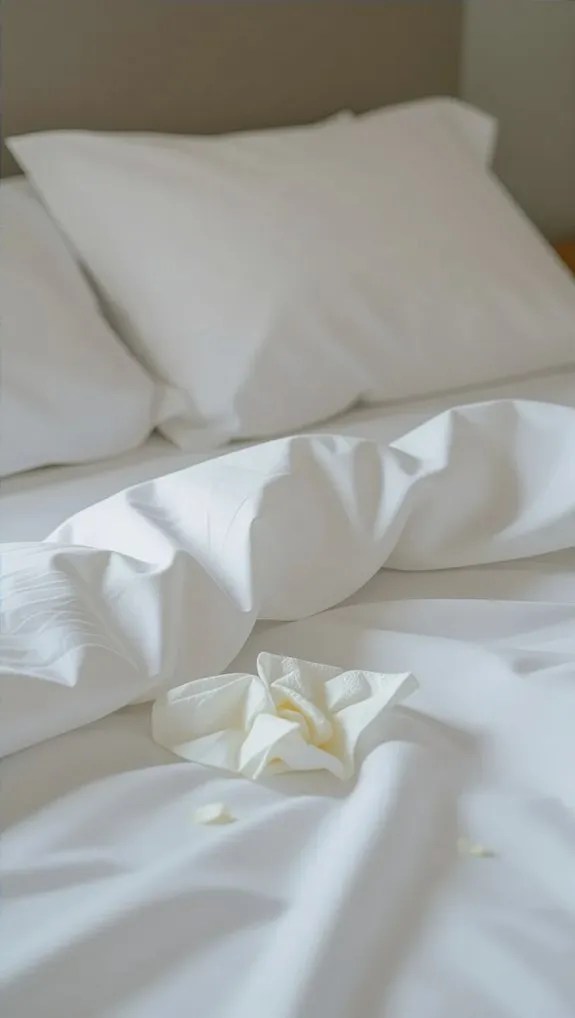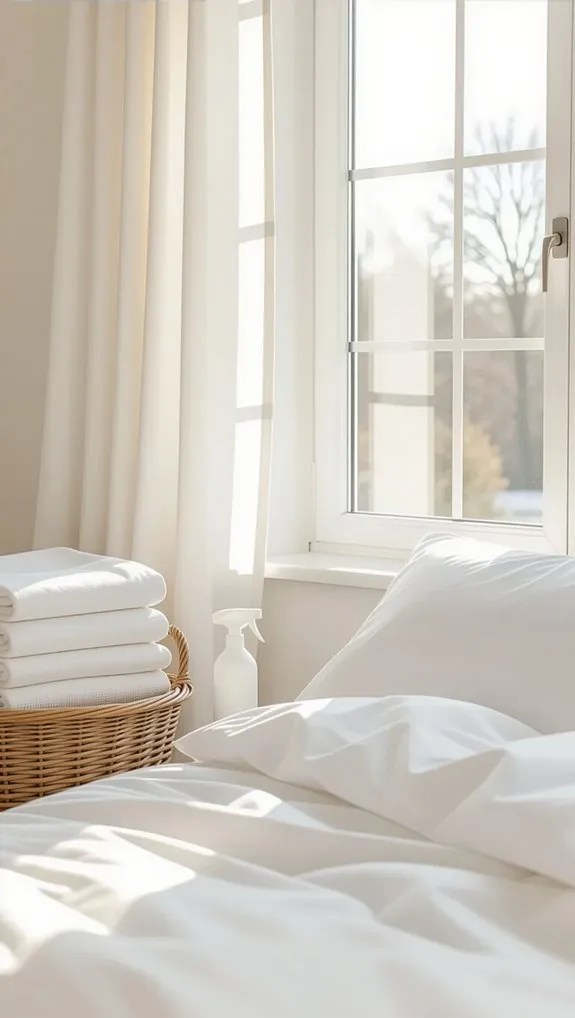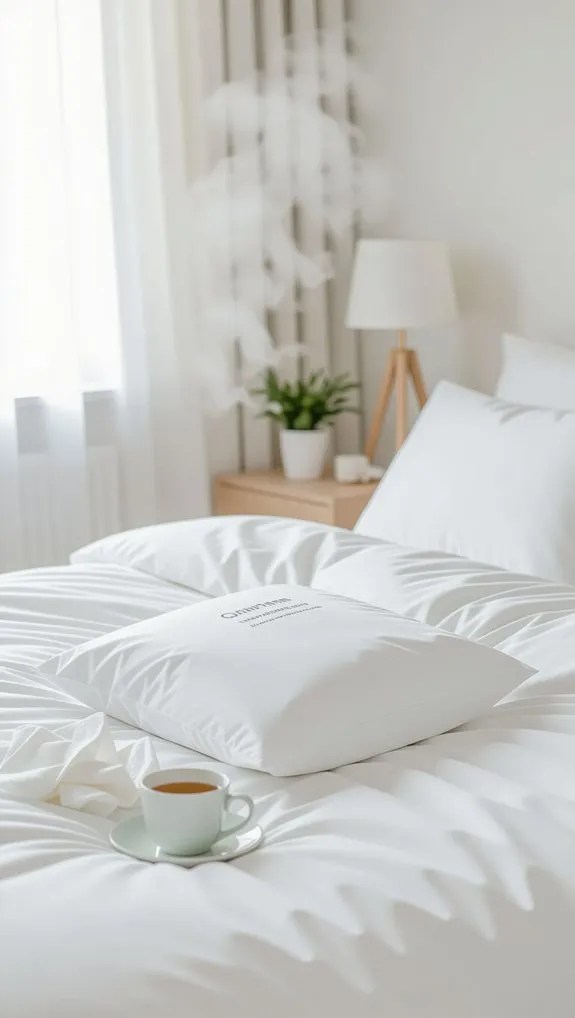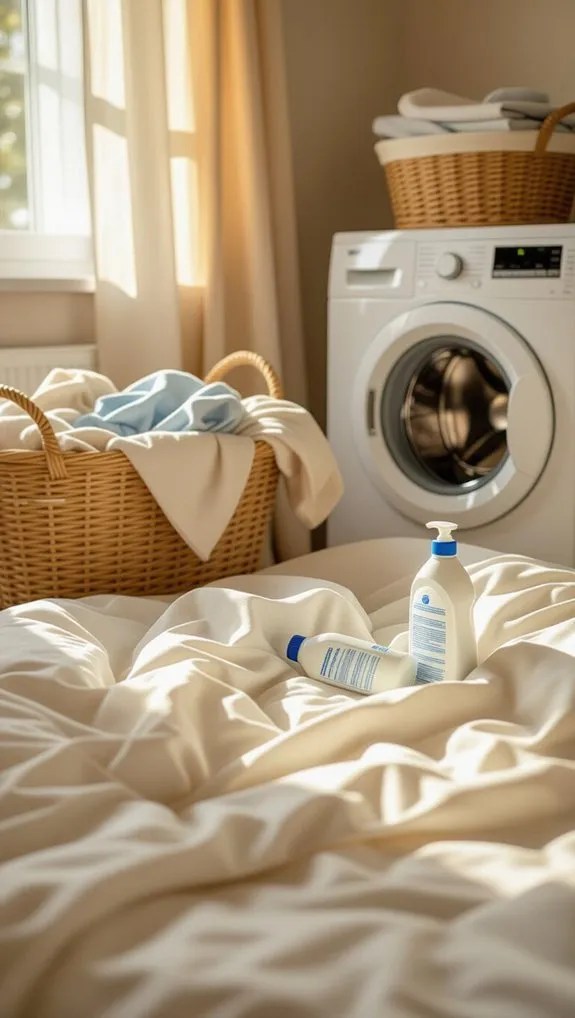How Often Should You Change Your Sheets: Clear Guide
Ever wondered how often you should change your sheets? If you’ve been questioning your current bedding routine, you’re not alone. Most people either change their sheets too frequently (wasting time and energy) or not nearly enough, which can impact sleep quality and hygiene.
This guide will walk you through the optimal sheet-changing schedule based on your lifestyle, sleeping habits, and specific circumstances. You’ll discover the factors that determine when it’s time for fresh bedding, plus practical tips to maintain that perfect balance between cleanliness and convenience.
We’ll also cover warning signs that indicate you need to wash your sheets sooner than planned, along with simple strategies to extend the time between changes without compromising your comfort or health.
How often should you change your sheets?

Since maintaining clean bedding is crucial for healthy sleep, grasping how often to change your bed sheets can make a significant difference in your overall rest and hygiene.
Most sleep experts recommend washing sheets weekly to reduce dust mites, dead skin cells, and allergen buildup. If you’re short on time, changing sheets every other week is better than never.
But for optimal health, aim to wash sheets weekly—especially if you have allergies, pets, or tend to sweat at night. Crisp, clean sheets not only look inviting but also contribute to a more hygienic sleep environment.
Factors that change your sheet schedule

While your sheet-changing routine might seem straightforward, numerous personal and environmental factors can significantly impact how often you’ll want to launder your bedding. Consider these key influences on your wash sheets weekly schedule:
| Health Condition | Lifestyle Factor | Bed Environment |
|---|---|---|
| Allergies/Asthma | Pet Ownership | Sweat/Moisture |
| Skin Infections | Night Cream Use | Food Crumbs |
| Respiratory Issues | Heavy Sweating | Dander/Hair |
If you’ve battled allergies, dust mites demand frequent washing. After illness, immediate laundering prevents pathogen spread. Pets in bed? You’ll need more frequent cleaning. Heavy sweating or night creams mean weekly (or twice-weekly) changes. Your unique circumstances dictate your ideal sheet-changing rhythm.
Signs your sheets need washing now

Comprehending when your sheets need an urgent wash goes beyond a predetermined schedule.
Visible stains like blood, sweat, or makeup are immediate red flags. If you notice a musty smell or wake up with increased allergy symptoms, it’s time to strip the bed.
Been ill recently? Change sheets immediately to prevent reinfection.
Sweat stains, body oils from workouts, or sleeping naked after a sweaty night also signal an urgent wash.
Your bedding’s cleanliness directly impacts sleep quality, comfort, and health. Don’t wait—act when these signs appear.
How to set a weekly routine

Setting up a weekly sheet-changing routine doesn’t have to be complicated—I’ll show you how to make it as simple as checking your calendar and grabbing a backup set.
My go-to strategy involves marking a specific day each week and creating laundry shortcuts that transform sheet changing from a chore into an automatic habit.
With the right approach, you’ll find yourself maintaining fresh, clean bedding without stress or extra mental effort.
Calendar reminders
Consistently tracking sheet-changing schedules can transform your bedroom hygiene and sleep quality.
I recommend setting a weekly reminder on your phone or calendar to change sheets and wash pillowcases. Pair this task with your existing laundry day to build a reliable habit. Use calendar labels that specify “Change sheets — wash pillowcases too” and set a short 10-15 minute alert.
A habit tracker can help you stay consistent, making sheet-changing feel less like a chore and more like a natural part of your routine. For those with allergies or pets, consider twice-weekly reminders.
Laundry shortcuts
Now that you’ve set up calendar reminders for changing sheets, streamlining your laundry routine becomes the next strategic step.
To wash your sheets effectively every week, rotate two sheet sets for convenience. Always pretreat stains immediately—spray with Zout or soak in OxiClean before washing. Use hot water to eliminate allergens and germs, but check the care label first. Dry on low heat to protect sheet fibers.
Handy hint: Keep one set on the bed and one ready in the laundry, making weekly changes simple and maintaining fresh, clean bedding without stress.
Backup sets
Let’s level up your sheet-changing game by stocking backup sets that transform your weekly laundry routine from stressful to seamless.
Keep two full sheet sets per bed, storing the extra sheets in your linen closet or under-bed drawer for quick access.
Having a third backup set becomes crucial if you’ve got pets, allergies, or night sweating.
The key is keeping your sets paired and folded, making sheet changes a breeze.
Do kids and babies need different schedules

Remarkably, sheet-changing schedules differ significantly between babies, infants, and older children. Babies’ sheets require more frequent attention due to their sensitive skin and potential for messes.
Consider these guidelines:
- Babies need sheet changes 2-3 times weekly
- Young children can wash weekly
- Potty-training toddlers need immediate changes after accidents
- Illness demands daily laundering of bedding
During illness or heavy sweating, increase washing frequency to prevent bacterial growth and skin irritation. Waterproof mattress covers can help manage unexpected messes and protect the mattress.
Comprehension of these nuanced approaches ensures your child’s sleeping environment remains clean, comfortable, and healthy.
What about sweat, pets, and allergies

Frequently, your bed’s cleanliness depends on more than just a regular washing schedule—it’s deeply influenced by lifestyle factors like nighttime sweating, pet interactions, and personal health conditions.
If you sweat heavily or have pets sharing your bed, you’ll want to wash sheets weekly to combat pet dander and reduce allergen buildup. Allergy sufferers should use hot water (130°F) to kill dust mites effectively.
Sweat and oils create a breeding ground for bacteria, so frequent washing becomes crucial. Pillow protectors and separate pet bedding laundering can further minimize contamination and ensure a cleaner, healthier sleep environment.
Wash sheets the right way today

Mastering the art of sheet washing isn’t just about cleanliness—it’s about creating a sleep sanctuary that supports your health and comfort.
When washing your sheets every week, follow these insider tips:
- Pretreat visible stains before washing
- Use hot water for deep cleaning and dust-mite control
- Skip fabric softeners that reduce breathability
- Dry on low heat to protect delicate bedding fibers
I’ve learned that proper sheet care isn’t complicated.
Should you change sheets when sick

When you’re battling an illness, changing your sheets isn’t just a matter of comfort—it’s a critical step in preventing the spread of germs and supporting your recovery.
Wash sheets after illness using hot water for disinfecting, and pretreat any bodily fluids with an enzyme stain remover. Replace pillowcases weekly during sickness, as they harbor bacteria and fungi close to your face.
Eco-friendly ways to wash more often

In the quest for cleaner sheets without harming the planet, eco-friendly laundry practices can transform your bedding routine from energy-intensive to environmentally conscious.
When washing sheets weekly, consider these strategies:
- Use cold water to save up to 90% energy
- Line-dry outdoors for zero electricity consumption
- Choose concentrated, biodegradable detergent
- Maintain two sets per bed for rotation
Common sheet washing mistakes to avoid

Because clean, comfortable sheets are essential for a good night’s sleep, grasping common sheet washing mistakes can save you from potential bedding disasters. Avoiding these pitfalls ensures your sheets stay fresh and last longer.
| Mistake | Correct Approach |
|---|---|
| Hot water every wash | Use cold water, warm only for tough stains |
| Overusing fabric softener | Minimize softener to maintain sheet breathability |
| High heat drying | Choose low/medium heat to prevent fiber damage |
Wash sheets weekly, pretreat stains before drying, and skip harsh chemicals. Your bedding will thank you with improved comfort, longevity, and that crisp, clean feeling we all love.
Frequently Asked Questions
How Often Should You Actually Change Your Sheet?
I recommend changing your sheets weekly to maintain good hygiene, remove allergens, and prevent bacterial buildup. If you sweat a lot or have allergies, wash them twice a week to keep your sleeping environment clean and fresh.
Is Once a Month Enough to Wash Sheets?
No, once a month isn’t enough. I recommend washing sheets weekly to remove sweat, dead skin cells, and bacteria. It’ll help prevent allergies, skin irritations, and keep your bedding fresh and hygienic.
What Are Signs You Aren’t Washing Sheets Enough?
I notice yellow sweat stains, musty odors, increased allergy symptoms, dark skin flakes, or dust mites on my sheets—these are clear signs I’m not washing them frequently enough and need to improve my laundry routine.
What Happens if You Don’t Change Bedsheets for 4 Months?
If I don’t change my sheets for 4 months, I’ll host a bacterial and fungal playground, accumulate millions of dust mites, develop nasty stains and odors, and potentially trigger allergies or skin infections.
In Conclusion
Ultimately, how often you should change your sheets depends on your personal circumstances, but weekly washing remains the gold standard for most people. I know keeping your sheets clean isn’t just about appearance—it’s about your health and sleep quality. By grasping your unique needs and setting a consistent routine, you’ll create a fresher, more hygienic sleep environment.
Whether you’re dealing with allergies, pets, or just want a cleaner bed, regular washing makes a huge difference. Don’t overthink it: aim for weekly changes, use hot water when possible, and listen to your body’s signals. Clean sheets mean better sleep—simple as that.
Ready to upgrade your entire sleep setup? Check out our bedding reviews to explore smart, well-reviewed options that combine comfort with easy maintenance, making your weekly sheet-changing routine even more rewarding.

